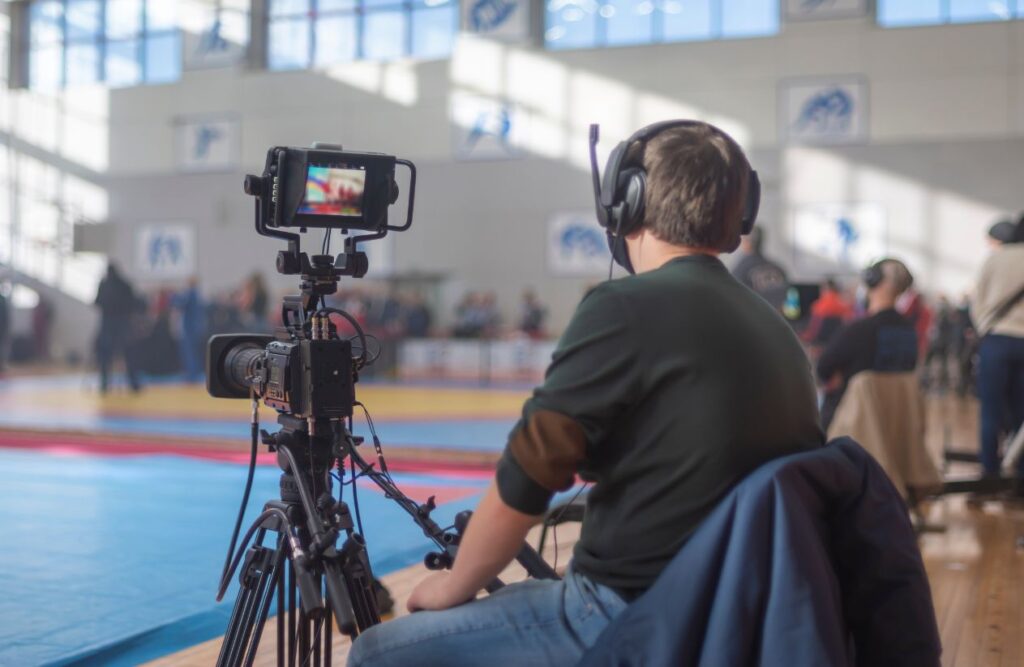Event Planning with AI: A Game Changer for Organizers

Integrating artificial intelligence (AI) into event management is transforming the landscape for organizers, enabling them to host more efficient, engaging, and memorable events.
The advent of AI technologies offers a plethora of benefits, from streamlined operations to personalized attendee experiences, making it an indispensable tool in a professional eventplanner’s arsenal.
Enhancing Personalization and Attendee Experience
One of the most significant advantages of employing AI in event planning is its ability to personalize the attendee experience at an unprecedented level.
AI algorithms can analyze attendee data, including past event interactions, preferences, and social media activity, to tailor recommendations, content, and networking opportunities.
This means that each attendee receives a bespoke event experience, increasing satisfaction and engagement rates.
Moreover, AI-powered chatbots can provide 24/7 assistance, answer queries, offer information, and even solve problems in real time, significantly enhancing customer service without the need for extensive human resources.
Streamlining Event Operations and Logistics
AI also plays a crucial role in optimizing event operations and logistics, making the planning process more efficient and less prone to errors.
For example, AI-powered tools can predict attendee numbers more accurately, helping with venue selection, catering needs, and resource allocation.
Furthermore, AI can automate routine tasks such as registration, ticketing, and scheduling, freeing up time for organizers to focus on more strategic aspects of the event.
This not only reduces the workload but also minimizes the likelihood of manual errors, ensuring a smoother execution of the event.
Driving Data-Driven Decision Making
The ability to collect and analyze large volumes of data is another way AI is revolutionizing event management.
Through AI, organizers can gain insights into attendee behavior, preferences, and engagement levels.
This data-driven approach enables them to make informed decisions about future events, from pinpointing the most popular speakers and topics to understanding the best channels for marketing and communication.
By leveraging AI for analytics, event planners can continuously improve their strategies, ensuring each event is better than the last, and solidifying their competitive edge in the industry.
In conclusion, the integration of AI into event management presents a wealth of opportunities for organizers to elevate their events.
From enhancing personalization to streamlining operations and bolstering data-driven decision-making, AI is indeed a game-changer in the field of event planning.
AI-driven Solutions for Flawless Event Scheduling and Management

Event planning and management have been profoundly transformed by the integration of AI technologies.
These advancements offer solutions that are not only efficient but also personalize the experience for attendees, ensuring flawless execution of events.
Below, we delve into various aspects of how AI-driven tools are redefining event scheduling and management.
Automated Scheduling and Calendar Management

One of the key challenges inevent planning is scheduling. AI has revolutionized this aspect by offering automated scheduling systems.
These systems can analyze the availability of participants, considering time zones and personal calendars, to suggest optimal meeting times.
Furthermore, they can automatically adjust schedules in real-time in response to cancellations or delays, significantly reducing the administrative workload on organizers and ensuring a smooth planning process.
Customized Attendee Experience
AI-driven solutions go beyond logistics; they enhance the attendee experience by providing personalized recommendations.
Based on previous behavior, preferences, and engagement levels, AI algorithms can suggest sessions, networking opportunities, and workshops most relevant to each attendee.
This level of customization ensures that participants have a unique and engaging experience, fostering higher satisfaction rates and increased engagement during the event.
Streamlined Event Operations

Operational efficiency is crucial for the success of any event. AI contributes significantly in this area through tools that manage registrations, ticketing, and even security checks, streamlining the process and reducing queues.
Additionally, AI-powered chatbots can provide instant support to attendees’ queries, improving the overall event experience.
The use of predictive analytics also helps in better resource allocation, crowd management, and anticipating the needs of attendees, thus enhancing the safety and smooth operation of the event.
Incorporating AI into event planning and management not only simplifies the logistical aspects but also elevates the experience for everyone involved.
As technology advances, the potential for creating more innovative and personalized events is boundless, marking a new era in the event planning industry.
Enhancing Audience Engagement: AI Tools for Musicians and DJs

In the rapidly evolving world of event planning, the fusion of technology and creativity has opened up a new frontier for enhancing audience engagement.
For musicians and DJs, leveraging Artificial Intelligence (AI) tools not only elevates their performance but also creates a unique, immersive experience that captivates their audience.
Also Read:Guide to Booking Top Edmonton DJs for Your Event
AI-Driven Music Creation and Remixing

The advent of AI in music creationhas been nothing short of revolutionary. Musicians and DJs can now utilize AI-based software to generate new compositions or remix existing tracks in ways that were previously unimaginable.
These tools analyze vast amounts of music to identify patterns, styles, and structures, enabling the creation of complex, captivating soundscapes.
This not only accelerates the creative process but also allows artists to experiment with different genres and sounds, pushing the boundaries of traditional music production.
Interactive and Personalized Performances
AI technology has paved the way for interactive performances, transforming the audience from passive listeners to active participants.
Through AI-powered apps and platforms, attendees can influence aspects of the live performance in real time, such as the setlist, visuals, and lighting.
This interactivity fosters a deeper connection between the artist and the audience, making each performance a unique, shared experience.
Additionally, AI can analyze audience data to tailor the performance to the preferences of those in attendance, ensuring a more personalized and engaging event.
Enhanced Visuals and Stage Effects
The visual aspect of a performance is just as crucial as the auditory experience. AI tools are increasingly used to synchronize stage effects, including lighting and visuals, with the music.
This synchronization creates a cohesive,immersive environment that enhances the overall impact of the performance.
By analyzing the structure and tempo of the music, AI can automate these elements in real time, allowing performers to focus on their art while delivering a visually stunning show.
By harnessing these AI tools, musicians and DJs can create unforgettable experiences that resonate with their audiences.
The integration of AI into music and event planning not only enhances the quality and engagement of performances but also sets a new standard for what ispossible in the realm of live entertainment.
Also read our article about“Embracing the Future: How AI is Transforming Event Technology”
Streamlining Event Logistics with Artificial Intelligence

In the dynamic world of event planning, both performers and organizers constantly seek innovative ways to enhance efficiency and deliver unforgettable experiences.
Artificial Intelligence (AI) is at the forefront of this transformation, offering tools and solutions that streamline event logistics like never before.
Optimizing Venue Management
One of the critical areas where AI shines is in the management of event venues.
AI-powered systems can analyze vast amounts of data regarding venue availability, size, location, and amenities, making it easier for organizers to find the perfect match for their events.
These systems can also predict potential issues with venues, such as maintenance needs or scheduling conflicts, allowing for proactive problem-solving.
Furthermore,AI can optimize space utilization within a venue, ensuring that every square inch is used efficiently, enhancing attendee flow and overall experience.
Personalizing Attendee Experiences
AI doesn’t just stop at logistical optimization; it extends its capabilities to elevate the attendee experience.
Through the analysis of past attendance data, social media interactions, and other digital footprints, AI can help organizers create highly personalized event experiences.
This could mean tailored event agendas, personalized greeting messages, and even customized recommendations for sessions or booths to visit.
Such personalization not onlyboosts attendee satisfaction but also increases engagement and participation rates.
Enhancing On-site Coordination
The day of the event is where most of the unforeseen challenges occur, from last-minute attendee increases to sudden changes in the schedule.
AI-powered tools can provide real-time solutions to these challenges, leveraging live data to adjust logistics accordingly.
For example, AI can reroute foot traffic within a venue to reduce congestion or dynamically reschedule sessions in response to delays or overflows.
Furthermore, AI-enabled robots and drones can be utilized for tasks ranging from delivering materials to capturing aerial footage of the event, all while reducing the need for manual labor and increasing operational efficiency.
Through the integration of AI into event planning, professionals can achieve a level of precision and personalization that was previously unthinkable.
This not only reduces the stress involved in managing complex logistics but also creates a more engaging and memorable experience for attendees.
As AI technology continues to evolve, its potential to revolutionize event planning becomes increasingly evident, promising a future where events are more seamless, interactive, and enjoyable for everyone involved.
Are you looking for a Musician for your event? Below is a list of Musicians that we recommend:
Event Planning with AI- FAQ Section
In the rapidly evolving landscape of event planning, Artificial Intelligence (AI) has emerged as a pivotal tool, transforming how professionals approach their tasks.
While the adoption of AI promises efficiency and innovation, it also raises several questions among event planners.
Here, we delve into some of the most common queries, providing clear insights to help integrate AI seamlessly into your event planning processes.
How Does AI Enhance Event Planning?
AI-powered tools can automate attendee registration, personalize event experiences based on attendee behavior and preferences, and provide real-time analytics for making informed decisions.
Is Implementing AI in Event Planning Cost-Effective?
Implementing AI-based solutions may require a significant investment, both in terms of financial resources and time spent learning new systems.
What Skills Do Event Professionals Need to Harness AI Effectively?
You don’t need in-depth tech knowledge to use AI. Focus on understanding data, staying updated on new AI tools, and being open to collaborating with tech experts.






